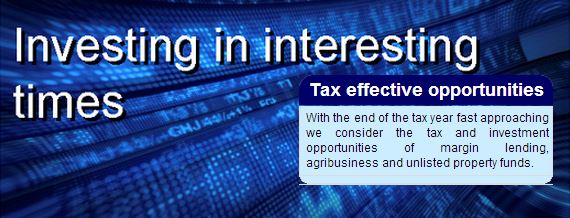Tax effective opportunities
With the end of the tax year fast approaching we consider the tax and investment opportunities of margin lending, agribusiness and unlisted property funds.
Looking back on the financial year, we have certainly been through some interesting times. The US sub-prime crisis has thrown up uncertainty in the market, and one thing
the market dosen’t like is uncertainty.
Many financial institutions have been forced to write down billions of dollars from their book, resulting in a tightening of the purse strings and a knock on effect for nearly all industries and markets.

Unless you’ve been sitting in cash, you will almost certainly have been affected as a result of the ‘sub-prime’ crisis and seen a reduction in the value of your investment portfolio.
In this issue we consider the current opportunities that exist in the market and some of the tax minimisation strategies available to investors as June 30th is fast approaching..
Looking for value in volatile times
I recently watched Al Gore’s “An Inconvenient Truth”, a film that tackles the impact of industrialisation on the environment. During Al Gore’s presentation he happened to show a chart highlighting world population growth, the exponential growth in population and that we are heading towards critical mass. The advances in medical science and subsequent increase in life expectancy has led to an explosion in population. World population data shows that we’ve managed to increase from 1.6 Billion in 1900 to just over 6 Billion at the turn of the century and an estimated 7 Billion by the year 2010. This makes me question, where are they all going to live and work? How are they going to get there and in the materialistic society that we’ve become, where are they going to keep all the things that they own?
You only have to look around the area that you grew up in to see the impact of this boom in population, gone are many of the green fields and open spaces, turned over to developers for more housing, more offices and more infrastructure.
This month we consider how asset classes such as direct property and agribusiness have managed to provide value to investors in a falling market. We now have an endless need for land and building materials. We feel that the performance of these asset classes coupled with tax effective investment structures means that now is a good time to consider them as part of your overall portfolio.
The impact of the sub-prime crisis
Sub-prime lending is the term used to describe non-standard home loans, ie loans to those who find it difficult to get a ‘standard’ home loan, typically those with low (or in some cases) no income.
The recent market volatility is rooted in the US. With the boom in property prices over the last few years, US home loan lenders have been very keen to get a larger slice of the pie and a whole raft of sub prime home loans have been introduced allowing a greater number of people access to home loans, not only as a way to borrow to buy their first home, but as a way of releasing equity from their home. Lenders then packaged up these sub-prime home loans and sold the debt to financial institutions all over the world.
As long as house prices were rising everything was fine. However, as they started to slow down and in some areas fall, it increased concerns that if the borrowers defaulted then lenders were unlikely to get all their money back.
Modern accounting methods force financial institutions into taking a worst case view on their assets and as a result many companies are having to crystallise paper losses, even though we have yet to see the extent of the loan defaults. Whilst in the context of global markets, sub prime lending is a relatively small amount, the ensuing write downs has led to a reluctance for institutions to invest in these packaged products and anoverall tightening of the belt. The resulting difficulty in institutional lending has impacted nearly all markets and sectors.
On a positive side, this has meant that cash deposit rates are quite high as banks look entice investors to balance their overall book of lending.
Diversification creates opportunity
As a personal investor in the markets for over 20 years,I personally experienced a number of cycles.
The one thing that is apparent time and time again is the value of a diversified portfolio.
Managing your own money is a very emotional experience and not only effects the value of your portfolio but can easily fall over into your work and personal life when you see significant falls in your portfolio and relate that to how hard you had to work to earn it in the first place.
One of the biggest mistakes I see in a portfolio time and time again is a lack of diversification. Investors sense of loyalty to the planner that put them in the product 10 years ago or a feeling of affinity for the fund that did so well when they first invested but has since fallen by the wayside find themselves over exposed to an asset class. Thus increasing the risk of their investments whilst they continue to sit in an outdated or under-performing fund.
Our portfolio healthcheck service, can help you with an independent appraisal of a funds performance, helping you to manage your own portfolio and understand if your overweight in certain asset classes.
This month, we have highlighted a couple of investment opportunities for investors looking for returns in a falling market and cover some of the basics for end of year tax planning.
Cromwell (unlisted) Property Fund
Favoured by many investors for their tax deferred income, unlisted property funds have once again come to investor attention after they have continued to provide returns in a falling market.
FEA Plantations Project 2008 (tax effective forestry)
There is an increasing gap between world supply and demand of timber coupled with the current tax incentives makes for a compelling investment
Free Portfolio Healthcheck
Probably the worst thing you can do is sit on an portfolio full of proverbial “dogs” in the hope that they’ll somehow get their act together and produce you the great returns overnight. We’re giving investors the opportunity to get a free report across all their managed fund investments.
Funds Focus is designed and written for DIY investors, looking to make investment decisions without financial advice. Our discounts and benefits have been developed with this in mind. If you would like personal financial planning advice you should seek independent advice.
What do we get paid
Wealth Focus will rebate 100% of the entry fee on managed fund investments as additional units and all of the sales commission received on agribusiness (8%) listed in this issue in the form of a cheque. Wealth Focus will receive a 2% marketing commission on agribusiness investments and may receive a trailing commission of up to 1.00% pa. for managed funds, and 0.5%pa for margin loans, depending on the manager we have a relationship with. This trailing commission is paid by the fund manager and is NOT an additional charge to the investor.

Comment: